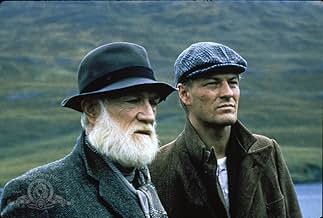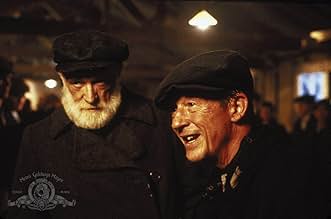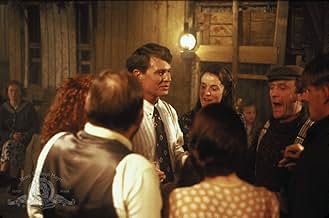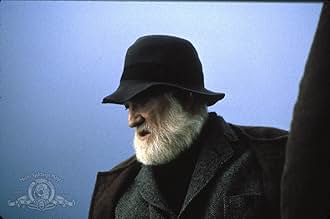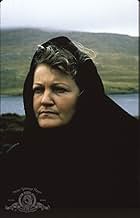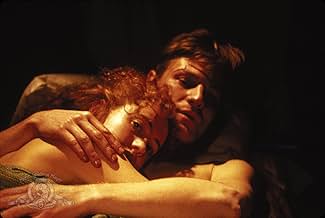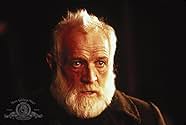अपनी भाषा में प्लॉट जोड़ेंWhen a field (which has been farmed by the McCabe family for generations) goes up for auction, the patriarch of the McCabe family will stop at nothing to prevent a rich American from buying ... सभी पढ़ेंWhen a field (which has been farmed by the McCabe family for generations) goes up for auction, the patriarch of the McCabe family will stop at nothing to prevent a rich American from buying it.When a field (which has been farmed by the McCabe family for generations) goes up for auction, the patriarch of the McCabe family will stop at nothing to prevent a rich American from buying it.
- 1 ऑस्कर के लिए नामांकित
- 4 कुल नामांकन
फ़ीचर्ड समीक्षाएं
The story of an Irishman fighting to own and protect the land he and his family transformed from rock-strewn waste to verdant pasture from foreign encroachment and development.
I won't recap the story line because it's so complex, but some thoughts occurred to me as I watched:
Bull McCabe perfectly symbolizes the heathen heart of Europe, untamed by Christianity (symbolized by the pasty-faced priest) or crass capitalism (symbolized by the bland Yank). Note how Bull carries a staff and wears cloak-like outfits throughout the film, looking very much like a Pagan high priest. He is, at heart, a savage who will cast off the artificial chains of foreign religions and phony social mores to defend one of the most primal concerns of man: territory.
The priest pointedly notes at one point that the people in this rocky Irish village are covered with only a "thin veneer of Christianity," implying that their paganistic racial memory runs too deep and strong to be ignored. And only a few scenes later is the first, bloody climax of the film when that "thin veneer" is ripped off.
An excellent film which deserved more praise than it got and should not be missed if the chance to see it arises.
"The Field" is a study of a very specific time and place, with plot developments that seem lifted straight out of the Old Testament. Sheridan does an excellent job of opening up the story, which was adapted from a stage play. The action takes place all over the village and surrounding areas. The cast is composed of Irish and English actors (except for - ahem - 'The American'), which really gives the film a strong sense of authenticity. Each character has a story, and the gradual unfolding of the various conflicts and secrets builds an ominous sense of impending disaster.
John Hurt gives another in a long line of outstanding performances, but this film belongs to Harris. The only thing that keeps it from becoming an all-time classic is Tom Berenger. We get no sense that he wants the field for any reason other than the script requires him to, and it seems that director Jim Sheridan knew it. When a central character (Berenger) in a film delivers his most important dialogue FACING AWAY FROM THE CAMERA (looking out a window), it is the directorial equivalent of punting. Even so, Berenger is not in enough scenes to ruin the movie. It is just that it could have been so much better if he brought something to the part that could match up with Harris' primal force.
Shot mostly in County Galway in Ireland, The Field certainly has the look and feel of The Quiet Man, but it's hardly in the same lighthearted spirit. In fact the priest in this film functions more like Karl Malden's priest of the docks in On The Waterfront.
Richard Harris has been a tenant farmer working the land for widow Frances Tomelty for years and has raised his family there. It's pretty much accepted by the villagers that it's Harris's land by right of sweat so when the widow wants to sell no one bids against him except Harris's sidekick John Hurt. But American Tom Berenger doesn't know the rules around there and he does bid.
But what Berenger wants to do is develop the place, put some Americanized shopping mall there. Imagine a strip mall on some of that beach-front property that John Ford so lovingly photographed in The Quiet Man and you can understand the feelings there. It all leads to a lot of tragedy.
Originally Harris was supposed to play the priest role that Sean McGinley had and who played it well. The lead was to go to Ray McAnally who had done this role on stage. When McAnally died, Harris was moved up to the lead and responded with an Oscar nominated performance for Best Actor. Harris lost that year to Jeremy Irons in Reversal of Fortune.
Also look for some nice performances here by Sean Bean as Harris's son and Brenda Fricker as his wife. All part of a very violent household.
Religion specifically the Roman Catholic Church takes a beating and The Field does touch on the conservative role of the church in society. It's a generally accepted fact that the Church did its level best to discourage revolutionary activity during the 19th century after the Irish lost their parliament in the Wolfe Tone rebellion. Harris and others in the film comment about how no priests died during the potato famine that they don't know how the tenant farmers live. And Sean McGinley as the village priest is by no means portrayed as a bad man.
There's also bad feelings towards Berenger who is seen as the descendant of people who cut and ran during the Irish troubles. Of course if a lot hadn't emigrated to all points of the globe, there would be a lot more trying to share the land that Harris wants to hold on to.
The Field is a fine drama about Ireland and the problems there that may not have been totally resolved with independence.
Irish traditions and landscapes are beautifully captured by the camera in this picturesque tale, a grim tragedy that plays out like a twisted morality tale with the viewer hating what McCabe does with his strong beliefs, tainted by false values and his own uncompromising ways.
As impressive as Harris is, JOHN HURT overplays his dimwitted brother to the point where his role seems like a parody of a clumsy character. SEAN BEAN is wonderfully restrained as the brother who is uneasy with his father's strong prejudices and beliefs and would rather not fight Berenger over a piece of land.
The tale becomes a Greek tragedy once Harris allows his passionate love of the land to overcome all reason. The parish priest tells his stoic villagers that such love of the soil can destroy the soil and that's what happens here.
There are some brilliant moments including the savagely staged fight scene by the sea on a misty night, but the story (based on a play) never quite achieves a meaningful conclusion with its very downbeat ending.
Realism of most of the performances is unquestionable, but the main reason for seeing it has to be Richard Harris' unforgettable performance as an Irishman who lets "the field" destroy his reasoning to the point of madness.
क्या आपको पता है
- ट्रिवियाWriter and director Jim Sheridan described Richard Harris "as mad as a brush", and that he found him very difficult to control.
- गूफ़During the opening scene when the donkey is thrown off the cliff, as it hits the water its legs collapse into it. This shows that the donkey was a stuffed animal.
- भाव
"Bull" McCabe: Why're you interfering, Father? This is none of the Church's business.
Father Doran: It's the Widow's field. She has the right to sell it.
"Bull" McCabe: No. It's my field. It's my child. I nursed it. I nourished it. I saw to its every want. I dug the rocks out of it with my bare hands and I made a living thing of it! My only want is that green grass, that lovely green grass, and you want to take it away from me, and in the sight of God I can't let you do that!
Father Doran: Can't you find another field?
"Bull" McCabe: Another field? Another field? Jesus, you're as foreign here as any Yank. Another field? Are you blind? Those hands, do you see those hands? Those rocks! It was a dead thing! Don't you understand?
Father Doran: This is the Widow's field. That's the law. The common law.
"Bull" McCabe: There's another law, stronger than the common law.
Father Doran: What's that?
"Bull" McCabe: The law of the land. When I was a boy, younger than Tadgh there, my brothers and sisters had to leave the land, because it couldn't support them. We wasn't rich enough to be priests or doctors, so it was the emigrant ship for all of them. I were the eldest, the heir. I were the only one left at home. Neighbours were scarce. So my father and I, we had our breakfast, dinner, and tea, working in that field without a break in our work. And my mother brought us the meals. One day, one day my father sensed a drop of rain in the air and my mother helped us bring in the hay before it was too late. She was working one corner of the field, and I was working in the other. About the third day, I saw her fall back, keel over so to speak. I called my father, I run to her. My father kneeled beside her. He knew she... he knew she was dying. He said an act of contrition into her ear and he asked God to forgive her her sins. And he looked at me, and he said, "Fetch a priest." Fetch a priest... And I said, "Let's - let's bring the hay in first. Let's bring the hay in first." My father looked at me with tears of pride in his eyes. He knew I'd take care of the land. And if you think I'm gonna face my mother in Heaven or in Hell without that field, you've got something else coming. No collar, uniform, or weapon will protect the man that stands in my way.
टॉप पसंद
- How long is The Field?Alexa द्वारा संचालित
विवरण
बॉक्स ऑफ़िस
- बजट
- IEP 50,00,000(अनुमानित)
- US और कनाडा में सकल
- $14,94,399
- US और कनाडा में पहले सप्ताह में कुल कमाई
- $27,948
- 25 दिस॰ 1990
- दुनिया भर में सकल
- $14,94,399
- चलने की अवधि1 घंटा 47 मिनट
- रंग
- ध्वनि मिश्रण
- पक्ष अनुपात
- 1.85 : 1
इस पेज में योगदान दें




